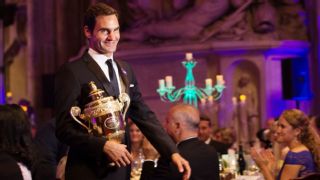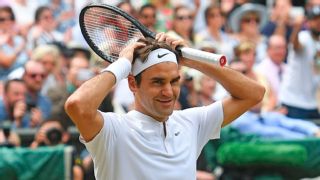|
In his moment of doubt, wondering how much of a future he still had in tennis after repeatedly falling short in Grand Slam finals, Roger Federer turned to his support team of family members, trainers and coaches. He asked them for an honest answer to the question every player faces when his body begins to give out, his production stalls and the pages on the calendar seem to be flying by. Do I still have it -- can I still win a major? "Basically the answer was always the same from them," Federer told the media Sunday after winning his second Grand Slam title of the year [19th overall] at Wimbledon. "[They said] that they thought if you're 100 percent healthy and you're well-prepared, you're eager to play, then anything's possible."  Sounds simple, but remember that when Federer asked that question he was rapidly approaching 35 on a bad knee. He prepared as best he could, but no matter what he did, the results just weren't there; he'd lost in his past three Grand Slam finals. And he was anything but eager to soldier on after Milos Raonic steamrolled over him and his aching knee in the 2016 Wimbledon semis. In fact, Federer was so dejected that he decided to call it quits for the year. That's when he asked the question. That's when his devoted wife, Mirka, coaches Severin Luthi and Ivan Ljubicic, and others expressed the confidence that he repaid in spades Sunday in London. When all the factors are tolled and put into context, Federer's resurgence in 2017 will take its place in the Comebacks Hall of Fame. Federer said he knew he could play "great" again one day. But even he didn't dare imagine that it would be with a upper-case "G." He said he might have laughed if someone told him he would win two majors this year, telling his interlocutors, "I guess you would have laughed, too." But here he is again. And thanks to his dazzling 31-2 record, he's on track to have one of the greatest years anyone has enjoyed. He also will by vying with his career nemesis Rafael Nadal, another player reborn in this astonishing year, for the year-end No. 1 ranking. That contest is something neither Federer nor Nadal had anticipated. Nadal is almost five years younger than Federer, but he grinds through his matches while Federer skates over them. Nadal has suffered more career-impacting injuries than the Swiss star, which makes his own renaissance this year comparably remarkable. Like Federer, Nadal has embraced a trio of priorities: remain healthy, enjoy the journey and win another major, or more. Becoming embroiled in a dogfight for the No. 1 ranking has been the furthest thing from either player's mind. That's one reason Federer skipped the entire clay-court segment and the French Open and Nadal chose to forgo grass-court tuneup events for Wimbledon. But Federer, up to No. 3 in the latest world rankings behind No. 1 Andy Murray and No. 2 Nadal, has always been keenly interested in tennis history, especially the chapters he is writing. Thus, replacing Andre Agassi as the oldest player ever to finish the year at No. 1 has come to have a sneaky kind of appeal. Lest anyone think that Federer is getting greedy, he pointed out Sunday that he never intended to take another lengthy hiatus this year. "I was always going to play more the second part of the season. I wasn't going to skip entire swings. ... I was always going to play as much as I possibly could, so I think I'm going to stay true to that." So the ball is in Nadal's court, and it will be a tricky one to handle. Federer has consistently had greater success than Nadal in the summer U.S. hard-court events, particularly the US Open. With No. 4 Novak Djokovic out for an unspecified period of time and Murray off his A-game and nursing a bad hip, Federer is not just well-positioned to do well until the end of the final Grand Slam of 2017, he towers over the field. That's exactly where he wants to be, because this is a man who for whom "pressure" is less adversary than aphrodisiac.  Federer was philosophical about his expectations, saying that he didn't think too much about the records he established with his win over Marin Cilic, not even when it was over and he was soaking up the ambiance during the trophy presentation. What he was thinking was how great it was to come through and win Wimbledon, where he had known so much frustration and doubt since he last won the event in 2012. "It's been a long road," he explained, "It's been an exciting road. It's been tough at times, but that's how it's supposed to be." For Federer, all roads lead to Centre Court. It's where he feels best and plays best. He claims that at this stage, his success is really the byproduct of his "consistency." That ability to routinely perform at the highest level under the most challenging conditions is only available to those who have a profound hunger for the spotlight. "I'm not shying away from the big stage," Federer said, insisting that from the start, he's never felt he hits the ball as well on secondary courts as on Centre. "That was always going to be a good thing." That's a remarkable attitude, and it goes some way to explaining Federer's success. Yet he insists that his love of that stage was neither created nor drilled into him by parents or mentors, like he was some kind of "project." "I was not that kid," Federer reiterated. "I was just really a normal guy growing up in Basel, hoping to make a career on the tennis tour. I guess I dreamed, I believed, and really hoped that I could actually maybe really do it, you know, to make it real." Federer certainly accomplished that. And now the only word for his achievements and what he's become is "unreal."
|
